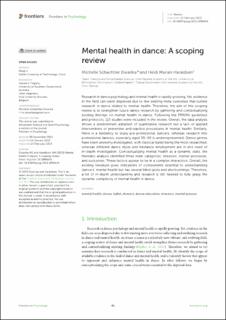Mental health in dance: A scoping review
Peer reviewed, Journal article
Published version

View/
Date
2023Metadata
Show full item recordCollections
Original version
10.3389/fpsyg.2023.1090645Abstract
Research in dance psychology and mental health is rapidly growing. Yet, evidence in the field can seem dispersed due to few existing meta overviews that outline research in dance related to mental health. Therefore, the aim of this scoping review is to present an overview of the state of the art and to strengthen future dance research by gathering and contextualizing existing findings on mental health in dance. Following the PRISMA guidelines and protocols, 115 studies were included in the review. Overall, the data analysis shows a predominant adoption of quantitative research but a lack of applied interventions of preventive and reactive procedures in mental health. Similarly, there is a tendency to study pre-professional dancers, whereas research into professional dancers, especially aged 30–60 is underrepresented. Dance genres have been unevenly investigated, with classical ballet being the most researched, whereas different dance styles and freelance employment are in dire need of in-depth investigation. Conceptualizing mental health as a dynamic state, the thematic analysis identified three main categories: stressors, the mental process, and outcomes. These factors appear to be in a complex interaction. Overall, the existing literature gives indications of components essential to understanding dancers’ mental health but has several blind spots and shortcomings, thus, a lot of in-depth understanding and research is still needed to fully grasp its dynamic complexity. Mental health in dance: A scoping review